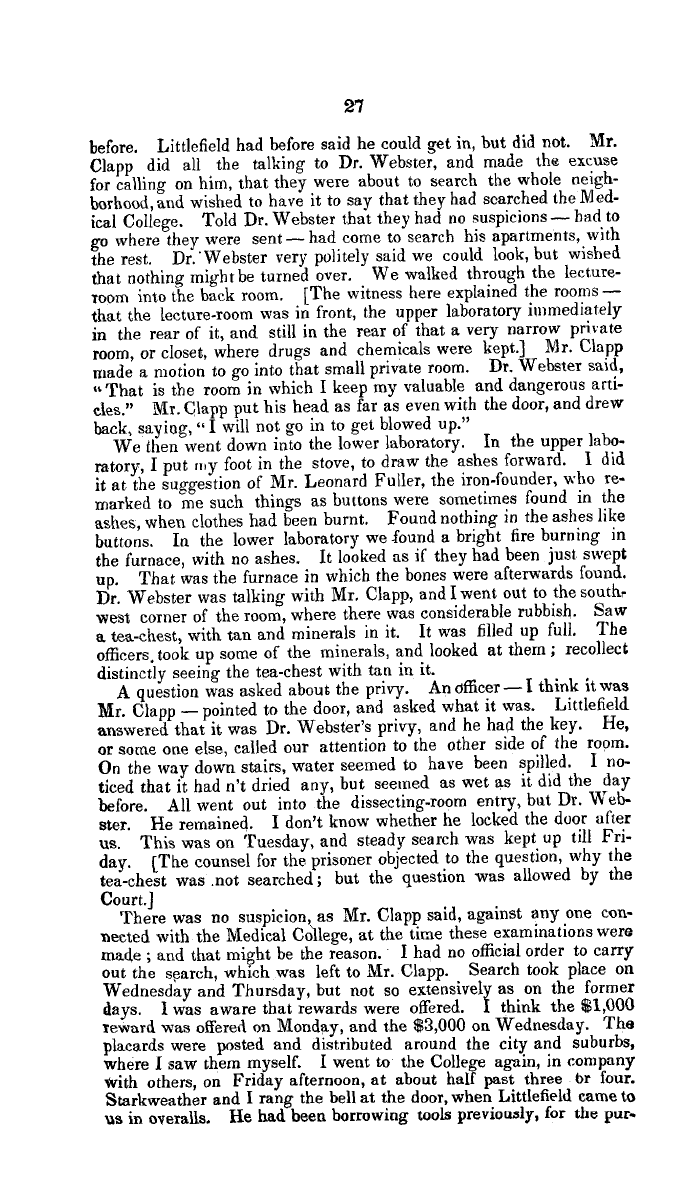|
27
before. Littlefield had before said he could get in, but did not. Mr.
Clapp did all the talking to Dr. Webster, and made the excuse
for calling on him, that they were about to search the whole neigh-
borhood, and wished to have it to say that they had searched the Med-
ical College. Told Dr. Webster that they had no suspicions- bad to
go where they were sent-had come to search his apartments, with
the rest. Dr.* Webster very politely said we could look, but wished
that nothing might be turned over. We walked through the lecture-
room into the back room. (The witness here explained the rooms-
that the lecture-room was in front, the upper laboratory immediately
in the rear of it, and still in the rear of that a very narrow private
room, or closet, where drugs and chemicals were kept.) Mr. Clapp
made a motion to go into that small private room. Dr. Webster said,
,$That is the room in which I keep my valuable and dangerous arti-
cles." Mr. Clapp put his head as far as even with the door, and drew
back, saying, " I will not go in to get blowed up."
We then went down into the lower laboratory. In the upper labo-
ratory, I put nay foot in the stove, to draw the ashes forward. I did
it at, the suggestion of Mr. Leonard Fuller, the iron-founder, who re-
marked to me such things as buttons were sometimes found in the
ashes, when clothes had been burnt. Found nothing in the ashes like
buttons. In the lower laboratory we found a bright fire burning in
the furnace, with no ashes. It looked as if they had been just swept
up. That was the furnace in which the bones were afterwards found.
Dr. Webster was talking with Mr. Clapp, and I went out to the south,
west corner of the room, where there was considerable rubbish. Saw
a tea-chest, with tan and minerals in it. It was filled up full. The
officers. took up some of the minerals, and looked at them ; recollect
distinctly seeing the tea-chest with tan in it.
A question was asked about the privy. An officer- I think itwas
Mr. Clapp - pointed to the door, and asked what it was. Littlefield
answered that it was Dr. Webster's privy, and he hall the key. He,
or some one else, called our attention to the other side of the room.
On the way down stairs, water seemed to have been spilled. I no-
ticed that it had n't dried any, but seemed as wet as it did the day
before. All went out into the dissecting-room entry, but Dr. Web-
ster. He remained. I don't know whether he locked the door after
us. This was on Tuesday, and steady search was kept up till Fri-
day. (The counsel for the prisoner objected to the question, why the
tea-chest was .not searched; but the question was allowed by the
Court.)
There was no suspicion, as Mr. Clapp said, against any one con-
nected with the Medical College, at the time these examinations were
made ; and that might be the reason. I had no official order to carry
out the search, which was left to Mr. Clapp. Search took place on
Wednesday and Thursday, but not so extensivel as on the former
days. I was aware that rewards were offered. I think the $1,000
reward was offered on Monday, and the $3,000 on Wednesday. The
placards were posted and distributed around the city and suburbs,
where I saw them myself. I went to the College again, in company
with others, on Friday afternoon, at about half past three br four.
Starkweather and I rang the bell at the door, when Littlefield came to
us in overalls. He had been borrowing tools previously, for the pur.
|

